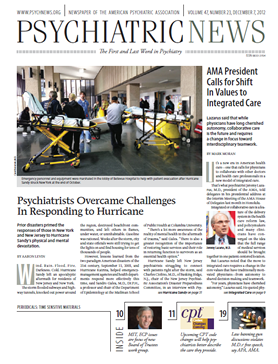Having attention-deficit/hyper-activity disorder (ADHD) in childhood portends a number of negative outcomes later in life, a 33-year follow-up of childhood ADHD subjects has found.
The study, which was headed by Rachel Klein, Ph.D., a professor of child and adolescent psychiatry at the New York University Child Study Center, was reported online October 15 in the Archives of General Psychiatry.
The study included 271 white men who were 41 years old. Out of the subjects, 135 had had childhood ADHD without conduct disorder. The remaining 136 had not had childhood ADHD, but had parents whose occupations matched those of the ADHD subjects. They served as control subjects.
The researchers compared the two groups on several outcomes and found that the former were generally doing more poorly than the controls were. They had significantly worse educational, occupational, economic, and social outcomes, as well as more divorces and higher rates of antisocial personality disorder, substance use disorder, and nicotine dependence.
For example, 31 percent of the ADHD subjects did not complete high school, compared with 5 percent of control subjects. The ADHD subjects were earning, on average, $40,000 a year less than the control subjects. Although most individuals in both groups were living with a spouse (70 percent and 79 percent), significantly more ADHD subjects were currently divorced (10 percent versus 3 percent) or had ever been divorced (31 percent versus 12 percent). The ADHD subjects were about three times more likely to have a substance use disorder and nicotine dependence than controls.
Moreover, 16 percent of ADHD subjects had antisocial personality disorder, while no controls did.
That none of the controls had antisocial personality disorder a third-of-a-century later needs clarification, Klein said in an interview. Some of the controls did have conduct disorder during adolescence, and about 8 percent developed antisocial personality disorder, but the prevalence at the average age of 25 was low, around 3 percent, and of these none retained the diagnosis at the average age of 41. “I was surprised that none of the controls continued on the path of antisocial personality, especially since, in contrast, the ADHD children fared much worse in this regard. The finding points to the possibility that among boys without ADHD, the extended prognosis for conduct disorder is good.”
Also, since the 12-month prevalence rate for antisocial personality disorder in American adults is 1 percent according to the National Comorbidity Survey Replication, “it is not surprising that the disorder is not found in a single sample,” Klein said.
But what is striking in any case, she concluded, is that “antisocial personality disorder disappeared completely among the men who did not have a childhood history of ADHD.”
Finally, the worst outcome for those in the ADHD sample was for those who developed both antisocial personality disorder and a substance use disorder. Also, the 22 percent of ADHD subjects whose illness had persisted into adolescence or early adulthood were especially at risk of developing an antisocial personality disorder and a substance use disorder.
Yet some good news also emerged from the study. While 84 of the 135 ADHD subjects developed a conduct disorder during adolescence, only 22 went on to develop antisocial personality disorder.
An unexpected finding, Klein added, was “that the men who had ADHD in childhood did not have relatively more new psychopathology during adulthood.” For instance, they had no more mood or anxiety disorders at age 41 than controls did. Indeed, “ADHD was not a lifelong disorder in the majority of cases,” Klein emphasized. “Most children went on to live fruitful lives, most were employed, most were in rewarding relationships, and most were happy with their situation.”
“This is a long-term follow-up study of 6- to 12-year-old boys who were diagnosed with ADHD,” child psychiatrist David Fassler, M.D., a clinical professor of psychiatry at the University of Vermont and APA treasurer, told Psychiatric News. “Of significant concern, they noted an increased incidence of incarceration and death compared to a matched control group. The results remind us that ADHD in childhood is often associated with persistent adverse consequences later in life. The findings also underscore the importance of early recognition and ongoing access to appropriate and effective treatment for children, adolescents, and adults with ADHD.”
The study was funded by the National Institutes of Health.

